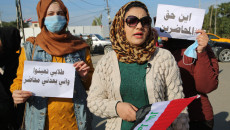A committee was formed to solve the issue of 398 people who were appointed by Baghdad for the Kirkuk Health Department, and the decision to appoint them is scheduled to be decided next week, after they filed an appeal against the suspension of the decision of their employment for not being born in Kirkuk.
Last August, the Iraqi Ministry of Health appointed 1,802 medical department graduates to the Kirkuk Health Department, but the governorate administration suspended the decision to appoint 398 of them who “are not born in Kirkuk, or that their documents do not prove that they are from Kirkuk,” which provoked protests by applicants and their families.
The instructions for appointments in Kirkuk state that the appointment includes only people who have a citizenship certificate, a residence card, and food ration card issued in Kirkuk relevant state departments and who have completed their education in Kirkuk.
We have agreed for the Citizens Affairs Department in the Governorate to look into the appeals submitted by graduates
Zhino Mutasim, a graduate of the nursing department from the Kirkuk Medical Institute and one of those covered by the decision to suspend appointments, told (KirkukNow), that "our ration card and our housing card are issued by Kirkuk, but we were not born in Kirkuk, and the Kirkuk administration is arguing that to suspend our appointment decision."
Zana Jalil, one of the graduates who was also excluded from the appointments list, said, "We were deported from Kirkuk during the Baath Party rule, so we are not born in Kirkuk, but our citizenship certificate is issued by Kirkuk, despite that they say that we are not included in the appointments."
According to the instructions for appointments, the applicant for appointment is required to be a resident of Kirkuk, but it is not required to be born in that governorate.
Some of the excluded attribute the decision to suspend their appointments to the failure to issue their residence card at the time from Kirkuk.
The burden of state employees has pushed the Iraqi government to halt employment, a step which piled hundreds of thousands of graduates and post graduates over the last few years.
Kirkuk and many provinces of Iraq regularly witnesses demonstrations and protests by postgraduates asking for state employment as the private sector is stagnated due to successive wars, instability and lack of state budget for investment in the public services.
The International Labor Organization ILO said last June unemployment rate in Iraq has jumped from 9% early 1990s into 14.2% in 2021.
Out of 40 million Iraqis, 9.2 million are employed while Iraq's state-dominated economy is led by the oil sector, which provides approximately 85% of state revenue. The government pays 400% more in salaries than it did 15 years ago. Around three quarters of the state’s expenditures in 2020 went to paying civil servants of the public sector.
On September 20, a number of graduates' representatives, whose appointment was suspended, gathered in front of the Iraqi parliament's office in Kirkuk to demand a solution to their problem.
The representative of Kirkuk province in the Iraqi parliament, Sabah Habib, who met with the protesters told (KirkukNow), "We intervened in the case and held a meeting in the presence of the director of health of Kirkuk, after which we met with the acting governor of Kirkuk, and we agreed that the Citizens Affairs Department in the provincial office would take over to consider the appeals submitted by the graduates.”
Final decision will be taken within a week
September 22, was the last day for objections to be received, and a final decision is due next week.
"A committee was formed in the governorate's office to check the certificates, housing cards and official documents for these graduates, and a final decision will be taken within a week," Habib added.
Ziad Khalaf, the assistant director of the Kirkuk Health Department, told (KirkukNow), "The committee will review the official papers and information, and a week has been set to resolve the case, and the governor and the Kirkuk health director will be in contact with the committee in order to conduct a thorough follow-up and find solution to the issue."
Over 30,000 graduates and postgraduates in Kirkuk province have filled out applications for 1,000 job opportunities, which are scheduled to be employed on contract basis for three years only with a monthly salary of 300,000 dinars (USD200), within the framework of the emergency security law.





